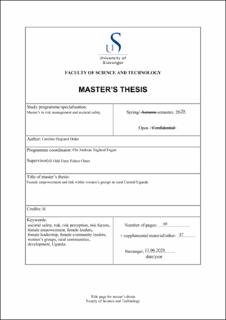| dc.contributor.advisor | Olsen, Odd Einar | |
| dc.contributor.author | Ordaz, Caroline Hegland | |
| dc.coverage.spatial | Uganda | en_US |
| dc.date.accessioned | 2021-02-16T13:18:02Z | |
| dc.date.available | 2021-02-16T13:18:02Z | |
| dc.date.issued | 2020-06 | |
| dc.identifier.uri | https://hdl.handle.net/11250/2728419 | |
| dc.description | Master's thesis in Risk management and societal safety | en_US |
| dc.description.abstract | This thesis sought to explore mechanisms that lie behind female empowerment in rural Central Uganda and the risk factors women meet when engaging in women’s groups. The research has been guided by the following problem statement: “What makes women in rural Central Uganda actively participate in women’s groups?”. The results show that for many women, engaging in a women’s group is more than a way to learn a new skill or meet other women in the same situation. It can also lead to a change in self-perception and self-awareness, thereby acting as a vehicle towards her empowerment. The data collection that formed the basis for this thesis was to a large extent carried out through field research with a fellow student researching water security in Central Uganda. Interviews, questionnaires and observations were conducted during the field trip. Being two researchers has been useful, as it facilitated the data gathering, the analytical interpretations and the quality assurance of the collected data.
The work has led to the following main findings:
- Female leaders are empowering women in their communities by being role models, changing mindsets and acting as a “push” to help some women to change their lives.
- Helping women to help themselves (through, for example, capacity building and counselling), is a sustainable way of making women less dependent on their husbands and changing the power structures in households, benefitting both women and men.
- Women’s groups are seen as highly important for the women in the communities and engaging in them is a way to improve one’s life. It is further regarded as a way to build resilience and reduce risk.
- Risk factors in engaging in groups are: Defying one’s husband, an increased workload and mental factors (such as stress).
- Reasons for engaging in women’s groups in spite of these risk factors are: To increase income, capacity building, social reasons and to improve one’s life condition.
- Lack of opportunities for employment is a major challenge for women in the communities studied.
- Commonalities between female leaders lie within personality, traits, motivations and cultural factors concerning gender roles. | en_US |
| dc.language.iso | eng | en_US |
| dc.publisher | University of Stavanger, Norway | en_US |
| dc.relation.ispartofseries | Masteroppgave/UIS-TN-ISØP/2020; | |
| dc.rights | Navngivelse 4.0 Internasjonal | * |
| dc.rights | Navngivelse 4.0 Internasjonal | * |
| dc.rights.uri | http://creativecommons.org/licenses/by/4.0/deed.no | * |
| dc.subject | samfunnssikkerhet | en_US |
| dc.subject | empowerment | en_US |
| dc.subject | female empowerment | en_US |
| dc.subject | risk | en_US |
| dc.subject | risiko | en_US |
| dc.subject | risk perception | en_US |
| dc.subject | risikopersepsjon | en_US |
| dc.subject | societal safety | en_US |
| dc.subject | risk factors | en_US |
| dc.subject | female leaders | en_US |
| dc.subject | female community leaders | en_US |
| dc.subject | women's groups | en_US |
| dc.subject | rural communities | en_US |
| dc.subject | development | en_US |
| dc.subject | Uganda | en_US |
| dc.subject | kjønnsroller | en_US |
| dc.subject | kvinnelige ledere | en_US |
| dc.title | Female empowerment and risk within women’s groups in rural Central Uganda | en_US |
| dc.type | Master thesis | en_US |
| dc.subject.nsi | VDP::Teknologi: 500 | en_US |
| dc.subject.nsi | VDP::Samfunnsvitenskap: 200 | en_US |

